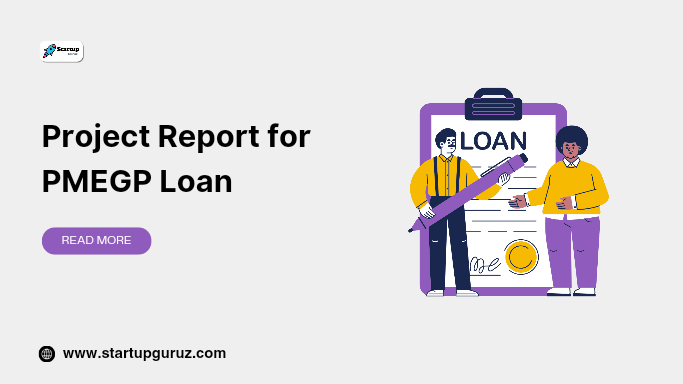
Creating a project report is a crucial step when applying for a PMEGP (Prime Minister’s Employment Generation Programme) loan. A well-structured project report not only increases your chances of loan approval but also helps in outlining a clear business plan. This guide will provide detailed insights into crafting a comprehensive Project report for a PMEGP loan, covering all necessary sections and providing helpful tips to ensure your report meets the required standards.
Table of Contents

The Prime Minister’s Employment Generation Programme (PMEGP) is a credit-linked subsidy scheme aimed at generating employment opportunities through the establishment of micro-enterprises in rural and urban areas. The scheme is implemented by the Ministry of Micro, Small and Medium Enterprises (MSME) and provides financial assistance to individuals and groups for setting up new ventures.
A project report serves multiple purposes:
A comprehensive project report for a PMEGP loan should include the following sections:
The executive summary provides a brief overview of the project. It should include:
The introduction should cover:
Detail the profile of your business, including:
Provide information about the promoters of the business:
Conduct a thorough market analysis to understand the industry landscape. This should include:
Outline your marketing strategy, covering:
The operational plan should detail how the business will function on a day-to-day basis:
The financial plan is a critical section that should include:
Detail the total project cost and the funding requirements:
Identify potential risks to the business and outline strategies to mitigate them:
Include any additional information that supports your project report:
Before starting the project report, conduct thorough research to gather all necessary information about the market, competitors, and financial requirements.
Draft a concise executive summary that captures the essence of your business idea and project.
Provide a comprehensive profile of your business, including its name, location, and legal structure.
Analyze the market to understand the demand, target audience, and competitive landscape.
Outline your plans for product development, pricing, distribution, and promotion.
Detail the operational aspects of your business, including production processes, technology, and human resources.
Develop detailed financial projections, including capital requirements, income statements, cash flow, and balance sheets.
Calculate the total project cost and identify the sources of funding.
Identify potential risks and develop strategies to mitigate them.
Compile all the sections into a coherent document, ensuring clarity and accuracy.
Review the report for completeness and accuracy. Make necessary revisions and finalize the document.
Submit the completed project report along with your PMEGP loan application to the appropriate authority.
Creating a detailed Project report is essential for securing a PMEGP loan. It provides a comprehensive overview of your business idea, market potential, operational plan, and financial projections. By following the steps outlined in this guide and ensuring all necessary components are included, you can increase your chances of loan approval and set a strong foundation for your business.
PMEGP (Prime Minister’s Employment Generation Programme) is a credit-linked subsidy scheme aimed at generating employment through the establishment of micro-enterprises.
A project report is essential for PMEGP loan approval as it outlines the business plan, financial requirements, and potential for success.
The executive summary should include the business idea, objectives, financial requirements, and expected outcomes.
Market analysis involves studying market size, growth potential, target audience, competitor analysis, and conducting a SWOT analysis.
Financial projections provide an estimate of future income, expenses, cash flow, and profitability, helping lenders assess the viability of the business.
The operational plan should be detailed enough to explain the production process, technology and equipment required, raw material sourcing, and human resource plan.
Risk analysis identifies potential risks to the business and outlines strategies to mitigate them, demonstrating preparedness and foresight.
Yes, you can include appendices with additional information such as resumes of promoters, copies of agreements, and technical specifications of machinery.
Project cost and funding requirements should include fixed capital (land, building, machinery) and working capital (raw materials, wages), along with the sources of funding.
Submit the project report along with your PMEGP loan application to the designated implementing agency, such as KVIC, DIC, or Coir Board, depending on your location.
By following this guide, you can create a comprehensive and effective Project report for your PMEGP loan application, ensuring all necessary information is included and presented clearly.